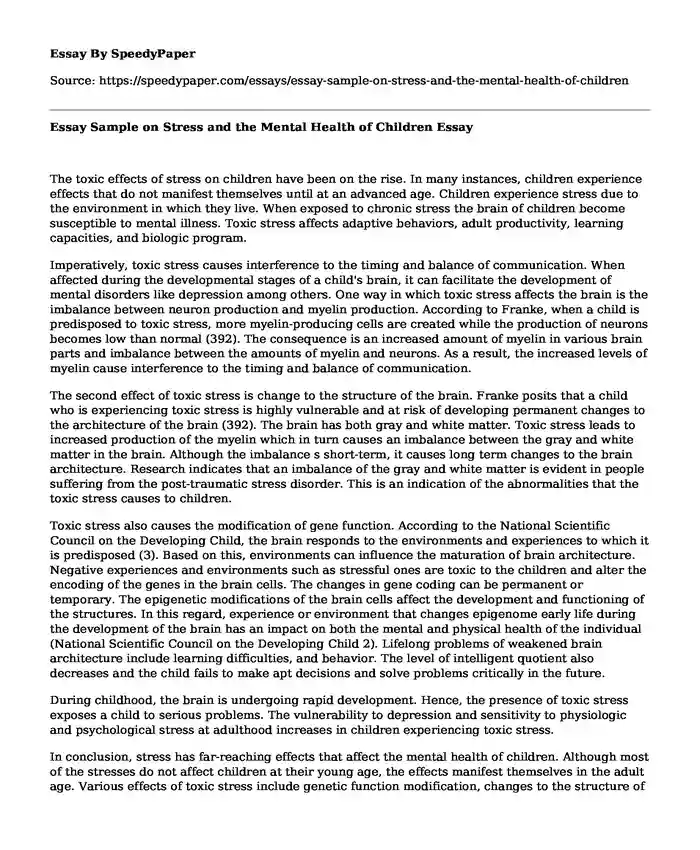
| Type of paper: | Essay |
| Categories: | Child development Stress Mental health |
| Pages: | 3 |
| Wordcount: | 610 words |
The toxic effects of stress on children have been on the rise. In many instances, children experience effects that do not manifest themselves until at an advanced age. Children experience stress due to the environment in which they live. When exposed to chronic stress the brain of children become susceptible to mental illness. Toxic stress affects adaptive behaviors, adult productivity, learning capacities, and biologic program.
Imperatively, toxic stress causes interference to the timing and balance of communication. When affected during the developmental stages of a child's brain, it can facilitate the development of mental disorders like depression among others. One way in which toxic stress affects the brain is the imbalance between neuron production and myelin production. According to Franke, when a child is predisposed to toxic stress, more myelin-producing cells are created while the production of neurons becomes low than normal (392). The consequence is an increased amount of myelin in various brain parts and imbalance between the amounts of myelin and neurons. As a result, the increased levels of myelin cause interference to the timing and balance of communication.
The second effect of toxic stress is change to the structure of the brain. Franke posits that a child who is experiencing toxic stress is highly vulnerable and at risk of developing permanent changes to the architecture of the brain (392). The brain has both gray and white matter. Toxic stress leads to increased production of the myelin which in turn causes an imbalance between the gray and white matter in the brain. Although the imbalance s short-term, it causes long term changes to the brain architecture. Research indicates that an imbalance of the gray and white matter is evident in people suffering from the post-traumatic stress disorder. This is an indication of the abnormalities that the toxic stress causes to children.
Toxic stress also causes the modification of gene function. According to the National Scientific Council on the Developing Child, the brain responds to the environments and experiences to which it is predisposed (3). Based on this, environments can influence the maturation of brain architecture. Negative experiences and environments such as stressful ones are toxic to the children and alter the encoding of the genes in the brain cells. The changes in gene coding can be permanent or temporary. The epigenetic modifications of the brain cells affect the development and functioning of the structures. In this regard, experience or environment that changes epigenome early life during the development of the brain has an impact on both the mental and physical health of the individual (National Scientific Council on the Developing Child 2). Lifelong problems of weakened brain architecture include learning difficulties, and behavior. The level of intelligent quotient also decreases and the child fails to make apt decisions and solve problems critically in the future.
During childhood, the brain is undergoing rapid development. Hence, the presence of toxic stress exposes a child to serious problems. The vulnerability to depression and sensitivity to physiologic and psychological stress at adulthood increases in children experiencing toxic stress.
In conclusion, stress has far-reaching effects that affect the mental health of children. Although most of the stresses do not affect children at their young age, the effects manifest themselves in the adult age. Various effects of toxic stress include genetic function modification, changes to the structure of the brain and interference to the timing and balance of communication.
Works Cited
Franke, Hillary A. "Toxic Stress: Effects, Prevention and Treatment." Children (Basel, Switzerland) vol. 1,3 390-402. 3 Nov. 2014, doi:10.3390/children1030390
National Scientific Council on the Developing Child. Early Experiences Can Alter Gene Expression And Affect Long-Term Development: Working Paper 10. 2010, https://developingchild.harvard.edu/wp-content/uploads/2010/05/Early-Experiences-Can-Alter-Gene-Expression-and-Affect-Long-Term-Development.pdf. Accessed 11 June 2019.
Cite this page
Essay Sample on Stress and the Mental Health of Children. (2023, Jan 14). Retrieved from https://speedypaper.net/essays/essay-sample-on-stress-and-the-mental-health-of-children
Request Removal
If you are the original author of this essay and no longer wish to have it published on the SpeedyPaper website, please click below to request its removal:
- Free Essay Redefining Aging
- Free Essay Sample with a Literature Review on Educational Games
- Photo Essay Sample about Mexican Immigrants
- Why I Want To Be a Nurse - Admission Essay Example
- 1.1 Provisional thesis statements During the genetic process of engineering a baby, first, there is making of a construct and after that placed inside the DNA of the baby, otherwise known as the host. Genetic engineering is has come under impeccable focus with the increased support from any quarters that has culminated to the progression of the genetically engineered babies that is seen to be the ultimate icing on the innovation cake.
- Exploring the Transformation of Futuristic Music: Essay Sample
- Essay Sample on Unethical and Disruptive Behavior
Popular categories




